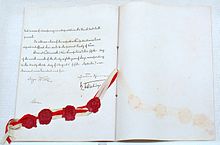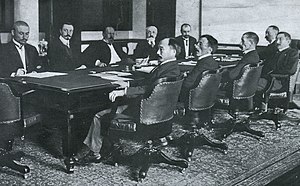Treaty of Portsmouth
The Treaty of Portsmouth of September 5, 1905, in the American city of Portsmouth, ended the Russo-Japanese War and secured for Japan the supremacy it had gained in the war in Korea and southern Manchuria.
After the naval battle at Tsushima on 27 May, in which the Russian fleet had suffered a devastating defeat, and after there had also been considerable unrest at home (Russian Revolution 1905), Tsar Nicholas II was forced to conclude a peace treaty of renunciation. The United States, under President Theodore Roosevelt, made itself available to broker the peace, so that the emissaries of both belligerent states - Sergei Yulyevich Witte and Roman Rosen for Russia, Komura Jutarō and Takahira Kogorō for Japan - met at the Portsmouth Naval Shipyard in Kittery, Maine (USA).
Sovereignty over Manchuria was granted to the Empire of China, but the formerly Russian leased territory of Kwantung on the Liaodong Peninsula, with the war port of Port Arthur, fell to Japan. Japan also received the formerly Russian concession for part of the Chinese Eastern Railway, which became the South Manchurian Railway. The concession for the railways in northern Manchuria remained with Russia. In addition, Russia had to cede the south of Sakhalin Island to Japan. Although Japan could not enforce its maximum demands (the whole of Sakhalin as well as compensation payments), it thus finally rose to regional supremacy. Nevertheless, the Hibiya riots occurred in Japan, and ultimately the government of Katsura Tarō had to resign in 1906.
The USA posed as neutral negotiators; in fact, however, they secured recognition of their possession of the Philippines in an informal agreement, in return for recognition of Japan's domination of Korea. Roosevelt himself received the Nobel Peace Prize in 1906 for his role as mediator. In parallel with the Portsmouth negotiations, Japan also reached an agreement with Great Britain on August 12, 1905, to renew and expand their 1902 alliance. For the great powers' China trade, these arrangements represented a confirmation of the open-door policy. The transformation of Korea into a Japanese protectorate in November 1905, on the other hand, was implicitly recognized by the Anglo-Saxon powers.
Japan's victory in the war against Russia represented the first significant victory by an Asian nation over one of the established European great powers and was thus seen by the Western great powers as a threat to their supremacy and by the Japanese at least as proof of their equality.

Treaty of Portsmouth

The negotiating delegations in Portsmouth, for Russia (back row of table): Korostovets (Иван Яковлевич Коростове ц), Nabokov (Константин Дмитриевич Набоков ), Vitte, Rosen (Роман Рович Розен ), Planson (Плансон ); for Japan (front): Adachi, Ochiai ( 落合謙太郎), Komura, Takahira (高平小五郎), Satō ( 佐藤愛麿).
Search within the encyclopedia